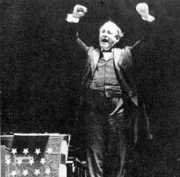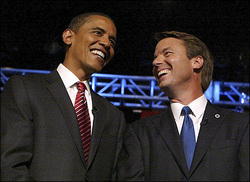The run-up to Iowa is revealing a single trend in both parties.
The rise of populism.
Populism lets you draw a direct line through the rise of Mike Huckabee, Ron Paul, John Edwards and (to an extent) Barack Obama. Both parties are flirting with Populism today to a greater extent than ever before, and for the same reason.
It’s the economy, stupid. (Right, William Jennings Bryan.)
The shorthand way Washington Villagers will explain this is that Huckabee represents religious populism, Edwards economic populism and Paul libertarian populism. That’s wrong. Huckabee carries an economic message as well, Edwards carries a libertarian message, and Paul is perfectly willing to see a theocracy if that’s what floats America’s boat.
They resonate because America has seen a succession of Populist uprisings at every time of political crisis. The Abolitionists of the 1850s were religious populists. The actual Populist Party reached its peak of electoral influence in the 1890s. Franklin Roosevelt won with the support of the Populists. George Wallace was a Populist.
Populism is a broad term, often difficult to define, but generally reflects a distrust of central authority, and a call for power to be given to the people, taken away from the central government. Its origins can be traced back to the first two crises in American political history — the contested 1800 election of Thomas Jefferson and the stolen 1824 election which fueled the rise of Andrew Jackson and the creation of the Democratic Party. Both men sounded populist themes, Jefferson the yeoman farmer and Jackson the idealized frontiersman. Both based their success on organizing people around their myths and values.
Populism is the real American political religion. No matter what we actually believe, or what we actually do, we tend to cloak ourselves in the guise of Populism, if only rhetorically. This makes the real thing tough to detect.
So what’s the key to discerning the real thing?
Add to My Profile | More Videos
Organization is the key. Not money, organization. More important, self-organizing.
Organization requires
that you have people commit time and energy to your cause, that they
follow the idealism you project. Huckabee has a natural base for this
in the mega-churches. Edwards built his out of the Netroots, the people-powered campaign of Howard Dean. Paul has a
base among libertarians, the sons and grandsons of those who drove the Goldwater revolution.
Organization can trump money. Organization can beat 30-second spots.
Organization is at the heart of democracy, small d. Organization
requires belief, as I’ve written here many times — it requires shared
myths of how we got here, and shared values of how we go forward.
Huckabee seems to have come from nowhere only because the Religious
Right, which has contributed the decisive ground troops to American politicians for most of the Nixon Era,
frankly avoided him for most of the year. They flirted with every other
candidate — first Giuliani, then Romney, then Thompson, even McCain —
and found all of them wanting. Then they discovered that Huckabee was
truly "one of them," that he really was Elmer Gantry, always had been,
and the knees jerked reflexively.
Huckabee is going to win Iowa. I suspect so too will Edwards. Paul will
do much better than anyone expects, maybe even well enough to snare
some delegates (it takes 15% in any caucus to win delegates). Iowa has
always liked Populists. The Midwest was the heartland for the original
Populist Party, and William Jennings Bryan himself came out of
Nebraska, which is in the same league as Iowa State.
The problem is that Huckabee’s style of populism is a spent force. It’s
an extreme form of what we’ve been living with for three decades, when
you look at it closely, only more assertive. It’s a lot like
McCarthyism, Eugene rather than Joe. When I speculated on this in The
1966 Game I answered with Tom Tancredo,
and that is one style of it — a very influential style in 2007. But
for 2008 religion, which appears as a positive message until the
sectarians get to squabbling, will prove far more important than
immigrant-bashing. You might even say that Huckabee is this year’s
version of Bobby Kennedy. (I was way off base when I made my first guess here in April, 2006.)
Remember, however, that in 1968 the Democratic Party was a spent force,
only the media didn’t know it. That coalition had split up and the
Populist energy it needed for victory had gone right with George
Wallace.
Just as in 2008 it’s going left, with Barack Obama and John Edwards.
Obama is offering a slicker version of what Edwards states explicitly,
which is why he’s doing better among Democrats who say their main goal
for 2008 is to win. (Even though polls show Edwards actually doing better in theoretical general election match-ups.)
The Netroots who gathered briefly around Edwards
after Dean’s 2004 fall have been split this year, giving general
approval to just about everyone and having little impact on the contest
as a result.
In Iowa, Edwards and Obama are campaigning to be the "anti-Hillary" and
right now Edwards has a slight edge in that contest because he’s
more forceful, more direct. The recent failures
of Congressional Democrats play to Edwards’ advantage. He demands
"better" Democrats while Obama simply calls for political peace, a
clean slate no one with any experience in politics thinks can be
created.
The Populist message is explicit in Edwards’ appeal and implicit in the
case of Obama. In a way Edwards is running as a 1968 version of Ronald
Reagan — pushed into that race as the true heir to Goldwaterism
— while Obama is running as the 1980 version, the genial "there you go
again" Gipper whose style masked his message. Edwards is running as Howard Dean. Obama is running as John F. Kennedy and, in a way, as Bill Clinton.
If Edwards and Obama finish one-two in Iowa, which is very possible,
and Edwards does well enough in New Hampshire to continue, which is
barely possible, it’s most likely they’ll still lose to Hillary Clinton
down the road, because institutional support for the party is too
strong, and the assumption that winning means accommodating is too
strong, for anyone but a new Nixon to be the one.
But nothing I’ve written here means anything more than what some Teevee or
MyDD pundit will tell you.
In the end the real message of Populism, its
enduring appeal, is that the people, the voters, you make these
choices, that you really do have the power.
And so you do.













